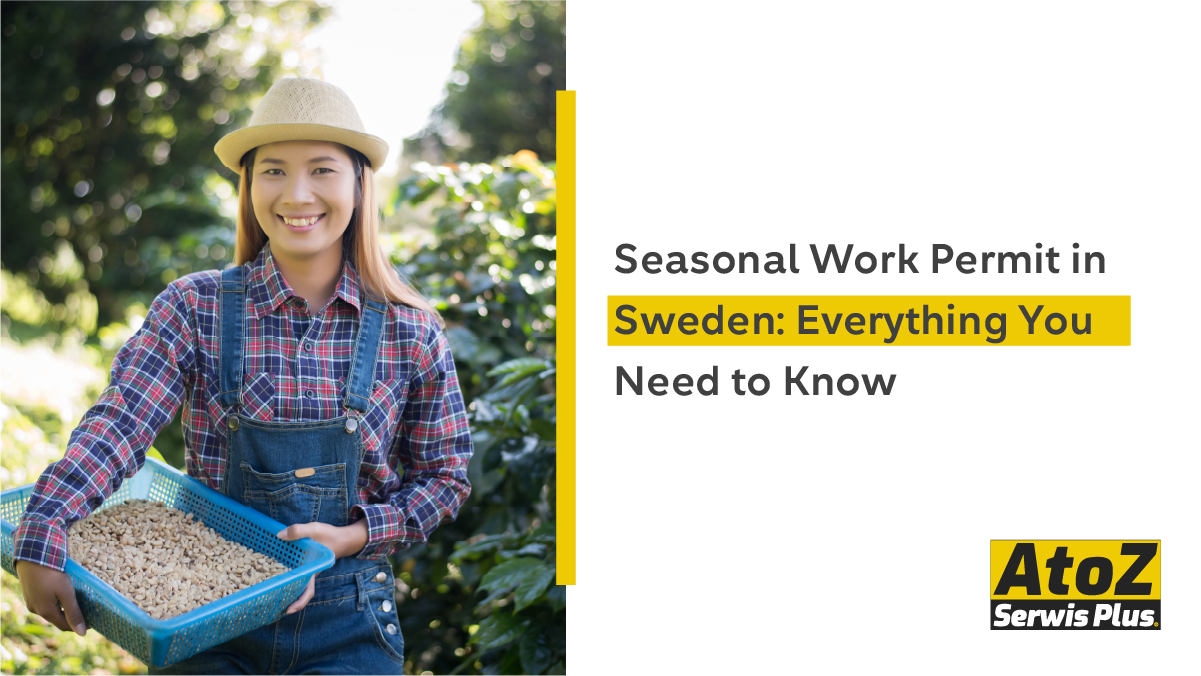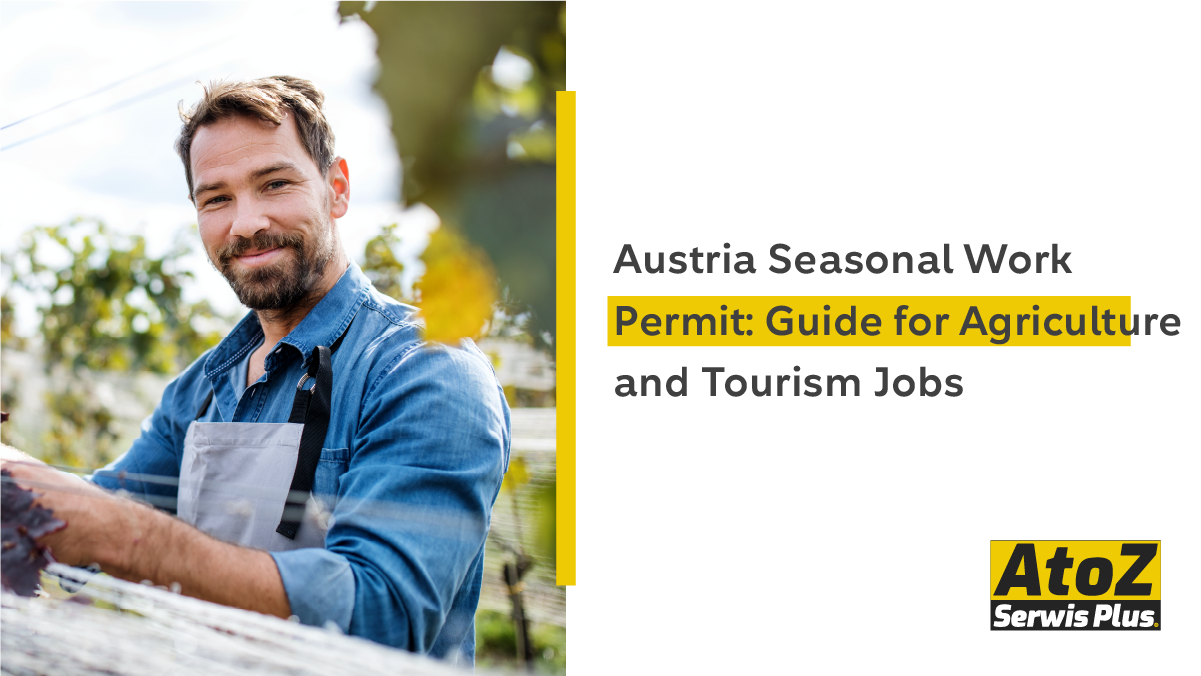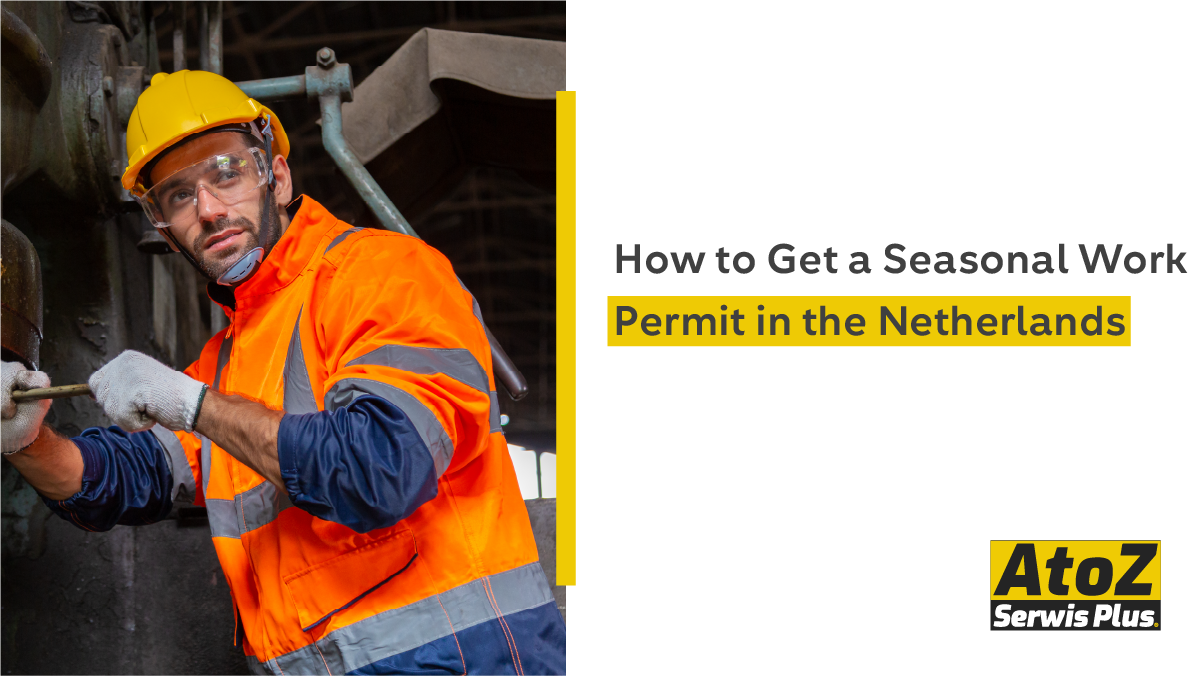

Seasonal Work Permit in Sweden: Everything You Need to Know
Seasonal work in Sweden has become an essential pathway for non-EU nationals who are looking for short-term, legal employment in Europe. Every year, Sweden relies on thousands of seasonal workers to fill labour shortages in industries such as agriculture, forestry, food processing, and tourism. These jobs are vital to the Swedish economy, particularly during peak times when the local workforce is insufficient to meet demand.
To ensure that seasonal workers are employed fairly and legally, Sweden requires foreign nationals to apply for a Seasonal Work Permit, administered by the Swedish Migration Agency (Migrationsverket). This permit not only allows non-EU workers to live and work in Sweden for several months but also ensures that their rights are protected under Swedish labour law.
This guide gives you a complete breakdown of everything you need to know — from eligibility and required documents to the application process, salaries, worker rights, and reasons why Sweden is a top choice for seasonal jobs.
What is a Seasonal Work Permit in Sweden?
A Seasonal Work Permit in Sweden is a temporary work and residence permit that allows foreign nationals from outside the EU/EEA to work in jobs tied to seasonal demand. The duration of the license ranges from a minimum of 90 days up to a maximum of six months within 12 months.
The most important condition is that the work must be seasonal in nature. This means it must be tied to specific times of the year and cannot be ongoing year-round employment. Examples include berry picking in the summer, working in food production during peak months, or staffing ski resorts in the winter.
It is also important to note that this permit does not provide a direct route to permanent residency in Sweden. It is designed exclusively for temporary work. However, many workers return year after year with new contracts, and employers often prefer hiring reliable seasonal staff from previous seasons.
Who Can Apply for a Seasonal Work Permit?
The permit is designed explicitly for non-EU/EEA and non-Swiss nationals. Citizens of EU/EEA countries do not require a work permit to work in Sweden, as they enjoy free movement rights within the European Union.
To be eligible, you must meet the following conditions:
- Valid Job Offer: You must already have a job offer from a Swedish employer in an industry defined as seasonal. The employment contract must clearly state the job role, salary, working hours, and duration.
- Health Insurance: You are required to have health insurance for your stay in Sweden. This ensures you are protected in case of illness or injury during your employment.
- Proof of Accommodation: You need to show where you will live while in Sweden, whether it is employer-provided housing, a rental agreement, or another form of accommodation.
- Intention to Return Home: The permit is temporary. You must confirm that you plan to return to your home country after the job ends.
These requirements ensure that seasonal work is organised, fair, and legally protected both for the workers and the employers.
In-Demand Seasonal Jobs in Sweden
Sweden has a wide variety of seasonal jobs that attract foreign workers. The most popular industries include:
Agriculture and Farming
This is the largest seasonal employment sector in Sweden. Every summer, thousands of workers are hired for berry picking, particularly strawberries, blueberries, and lingonberries. There is also high demand for vegetable harvesting, apple orchards, potato farming, and greenhouse farming. These jobs are physically demanding but often include free or subsidised accommodation.
Forestry
Sweden has vast forest areas that require a seasonal workforce. Workers are hired for tasks such as tree planting, logging, and timber preparation. Forestry jobs are typically outdoor-based, physically demanding, and often located in rural areas, where the employer may provide housing support.
Hospitality and Tourism
Sweden’s tourism industry has peak seasons in both summer and winter. In the winter, ski resorts employ seasonal staff such as cleaners, servers, receptionists, and kitchen assistants. In the summer, hotels, restaurants, holiday parks, and cruise operators hire additional workers to handle the influx of tourists. Many jobs come with staff meals and accommodation.
Food Processing
Sweden also hires seasonal workers for its food industry. Jobs include packaging, meat processing, and working on production lines during periods of high demand. These jobs often provide stable working hours and canteen meals.
Required Documents for Application
When applying for a Swedish Seasonal Work Permit, you must prepare all necessary documents carefully. Missing documents can cause significant delays or even result in rejection. The primary documents required are:
- Valid Passport – It must cover your entire stay in Sweden. If your passport expires soon, you should renew it before applying.
- Employment Contract – A signed contract or job offer from a Swedish employer, clearly stating your role, salary, and duration of employment.
- Proof of Accommodation – A rental contract, confirmation from the employer, or another official housing arrangement.
- Health Insurance – Proof that you have valid health insurance in Sweden for the duration of your stay.
- Application Form – Completed via the Swedish Migration Agency’s Migrationsverket portal.
- Biometric Photos – Passport-sized photos that meet Swedish requirements.
- Proof of Financial Means – If your employer does not provide comprehensive benefits, you may be required to provide bank statements or evidence of savings.
- Visa Fee Payment Receipt – The application fee is SEK 1,500 (about €130) and must be paid in advance.
Step-by-Step Application Process
Step 1: Secure a Job Offer
You must first obtain a job in Sweden. Seasonal job listings are often posted on the Swedish Public Employment Service (Arbetsförmedlingen) website and through licensed recruitment agencies.
Step 2: Employer’s Role
Your employer must provide a signed employment contract and ensure that the job meets Swedish seasonal work regulations.
Step 3: Prepare Documents
Gather your passport, contract, housing proof, insurance documents, and photographs. Please make sure they are accurate and complete.
Step 4: Submit Application
Applications can be submitted online through the Migrationsverket portal or at a Swedish embassy or consulate in your home country.
Step 5: Pay the Fee
The visa fee is SEK 1,500 (~€130). It can be paid online during the application process or directly at the embassy.
Step 6: Wait for Processing
Applications typically take between 1 and 3 months to process. Seasonal peaks may cause longer waiting times.
Step 7: Biometrics
You will be required to provide fingerprints and photos at the embassy or a Migration Agency office.
Step 8: Decision
If your application is approved, you will receive a residence permit card or visa sticker in your passport.
Step 9: Arrival in Sweden
Once in Sweden, you must register with the Swedish Tax Agency (Skatteverket) to receive a personal identity number, which is essential for paying taxes and receiving benefits.
Step 10: After Employment Ends
When your contract is complete, you must leave Sweden. Overstaying can result in fines, deportation, and bans from entering the Schengen area again.
Salaries for Seasonal Workers in Sweden
Seasonal jobs in Sweden pay fairly compared to many other European countries. Farming. Here’s what workers can expect:
- Agriculture/Farming: €10 – €13 per hour, often with free housing and meals provided.
- Forestry: €11 – €15 per hour, sometimes with allowances for outdoor work.
- Hospitality/Tourism: €12 – €16 per hour, with staff meals, discounts, and housing included.
- Food Processing: €11 – €14 per hour, with shared accommodation and canteen meals.
These salaries may seem modest compared to permanent jobs in Sweden, but they are highly competitive in the seasonal labour market.
Worker Rights in Sweden
Sweden has some of the strongest worker protection laws in Europe. Seasonal workers are entitled to:
- Working Hours: A maximum of 40 hours per week, with extra overtime pay.
- Wages: Salaries must comply with collective agreements in the relevant industry. Seasonal workers cannot legally be paid less than local employees.
- Contracts: Written contracts are mandatory and must include job details, wages, and benefits.
- Health Insurance: All workers must be covered by valid health insurance.
- Taxes: Workers must pay Swedish income tax. Employers usually deduct it directly from salaries.
- Accommodation: Employers often provide or arrange housing for seasonal staff at reduced rates.
Why Choose Sweden for Seasonal Work?
Sweden is one of the best destinations for seasonal workers in Europe for several reasons:
- High demand: Thousands of vacancies each year in multiple industries.
- Fair wages: Salaries comply with collective agreements, ensuring workers are treated fairly.
- Strong protections: Seasonal employees benefit from Sweden’s robust labour laws.
- Safe working conditions: Swedish employers must meet high health and safety standards.
- Cultural experience: Seasonal work lets you experience Sweden’s unique landscapes, culture, and traditions while earning money.
FAQs – Seasonal Work in Sweden
1. How long can I work in Sweden on a Seasonal Work Permit?
Between 90 days and 6 months within 12 months.
2. Do I need a job offer first?
Yes, a valid employment contract is mandatory.
3. What is the application fee?
SEK 1,500 (~€130).
4. Which industries hire seasonal workers?
Agriculture, forestry, hospitality, and food processing.
5. Can I extend my permit?
Yes, but the total stay cannot exceed six months per year.
6. Do EU/EEA citizens need a permit?
No, they are free to work in Sweden without restrictions.
7. Can I bring my family?
No, family reunification is not possible under a seasonal permit.
8. How long does processing take?
Typically 1–3 months.
9. Is health insurance required?
Yes, it is compulsory for all non-EU workers.
10. What salaries can I expect?
Between €10 and €16 per hour, depending on the industry.
Final Thoughts
Sweden offers one of the most seasonal farming opportunities in Europe. With strong demand in Farming, forestry, hospitality, and food production, non-EU workers can find well-paid short-term jobs while experiencing life in Scandinavia.
The process is straightforward: secure a job offer, prepare your documents, apply through Migrationsverket, and wait for approval. Once in Sweden, workers benefit from fair wages, legal protections, and safe working conditions.
AtoZ Serwis Plus can help you find legitimate seasonal jobs, prepare the necessary paperwork, and guide you through the entire application process for a Swedish Seasonal Work Permit.


















